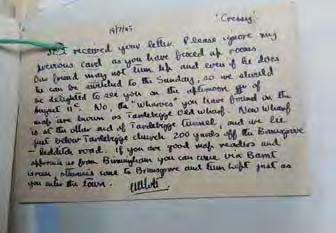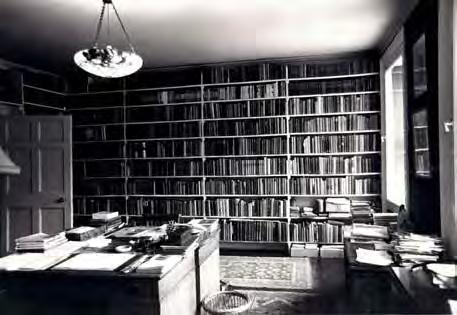
8 minute read
It Began at Tardebigge
Robert and Ray Aickman in the bow of Cressy when they joined Tom and Angela Rolt on a trip to Banbury in 1946.
This August marks 75 years since IWA founders Tom Rolt and Robert Aickman fi rst met on the Worcester & Birmingham Canal. Waterways looks back on the historic event and how it has been celebrated through the years
On Saturday 11th August 1945 at around 2.30pm, a meeting took place on narrowboat Cressy, moored above the top lock of the Tardebigge fl ight on the Worcester & Birmingham Canal. Back then it would have been viewed as li le more than an informal social event – two couples greeting each other for the fi rst time – yet it was a meeting that, in due course, was to have life-changing e ects on the individuals, as well as far-reaching consequences for Britain’s waterways.
First contact
At the meeting were: L.T.C. (Tom) Rolt, who had been living on Cressy at Tardebigge throughout World War II with his wife Angela and had recently published his fi rst book Narrow Boat, and Robert Aickman, a literary agent, with his wife Ray. Robert wrote to Tom a er reading his book, saying: “For many years I have been interested in canals, and distressed both by the neglected condition of many of them and by a certain lack of enterprise… with which the remainder are too commonly administered. I think, as you say, there is a real danger of the canals merely being allowed to die; and for no good reason as, properly administered, they could still occupy a perfectly sound place in the national economy.”
Robert continued by suggesting that a socie should be formed to promote the regeneration of canals. He proposed that it might present itself somewhere between the Light Railway Transport League (which was championing the case for trams) and a supporter group like the Friends of Canterbury Cathedral, and that it should be a disinterested body of “enthusiasts (not fanatics)”.
In replying to Robert, Tom wrote: “Six months ago I would have doubted whether such a project would receive an adequate response but now, judging by the number of le ers I have received, I am inclined to think otherwise.” a le er dated 18th July that he and Ray, together with two iends (Howard Coster, a photographer, and his wife), were staying at the Queen’s Hotel in Birmingham over the night of Saturday 11th August and would like to visit on that a ernoon. Tom gave precise instructions of how to fi nd their mooring: “New Wharf is at the other end of Tardebigge Tunnel and we lie just below Tardebigge Church, 200 yards o the Bromsgrove and Redditch road.”

Robert Aickman steering a narrowboat in 1950.
The book-lined offi ce in Aickman’s Gower Street apartment hosted the fi rst IWA meeting on 15th February 1946.




A card dated 18th July 1945 from Tom to Robert, confi rming the details of their meeting on 11th August.
The couples got on extremely well at their fi rst meeting, despite their obvious di erences – Robert being a ci dweller whose practical skills extended to map-reading but not driving, and Tom a trained engineer who favoured the countryside. For the Aickmans there was excitement in boarding a converted narrowboat for the very fi rst time and fascination in seeing the way Tom had fi ed it out as a liveaboard.
Unfortunately, neither Robert nor Tom recorded in their separate autobiographical books anything of the discussion that took place – the subsequent bi er disagreements meant they both largely ignored this fi rst meeting of minds. Frequent le ers (now housed in the National Archive at Kew) between Tom and Robert, and, to a lesser degree, between Angela and Ray, do, however, make it obvious that the fi rst meeting passed o exceptionally, and the Aickmans made a return visit the following Sunday.
They had booked to stay again in Birmingham and their intention was to return the Rolts’ hospitali by inviting them to dinner. This o er was politely rejected by Tom, who wrote: “We much appreciate your invitation to dine with you in Birmingham but, to be perfectly ank, we think so li le of Birmingham, its hotels and its train service, that we would much prefer you to stay on and dine with us on the boat. I believe there is a train back at about 9.24pm and I would take you to the station by car. Perhaps if we come to London in the autumn you would then have a more favourable opportuni to get your own back on us!”
Early stages
At this second meeting, discussion turned towards the problems facing the canals and how to tackle them. In a le er sent three days later, Tom wrote: “I don’t know if you have any ideas about the exact title of the Socie , but I would suggest that the word ‘waterways’ rather than ‘canal’ should be used, otherwise it might be seen to exclude rivers.” He suggested that the waterways should be brought under some form of public responsibili on the lines of the Thames Conservancy Board and that waterborne transport should be entrusted to small private traders operating through a ‘clearing house’.
Even at this early stage, there had been talk about the potential for restoring the River Avon Navigation (on which Tom and Angela had hired a boat om
Tom Rolt steering Cressy on the Grand Union Canal.
Wyre Piddle in 1938). “The expense of reviving the Avon locks would not be so great as is suggested here [in an enclosed le er]. It is a good example of the sort of thing the Socie might accomplish if it really prospered,” Tom discerned (though it would be fi ve years before the restoration of the Lower Avon was started).
A er a month-long gap in correspondence while the couples enjoyed separate holidays, Tom wrote to Robert on 18th September about arranging their next meeting: “Owing to the fall of the year and the fact that my job is not yet at an end etc, we have decided it would be be er for all concerned if you visited Cressy for a stay and taste of canal travel next spring when, all being well, we hope to be on the move again.”
The Aickmans took an opportuni to persuade the Rolts to make their overdue visit to stay with them in London on 19th November when Tom received an invitation om the Prime Minister’s o ce. “We have been asked to Dinner on Tuesday November 20th by Atlee’s Secretary to meet a man who is crazy about canals. His name is [Charles] Hadfi eld and he has something to do with the OUP [Oxford Universi Press]. He writes learned essays on canals!” Tom explained.

Inaugural IWA meeting
The next time they met was 15th February 1946 for the inaugural meeting of the Inland Waterways Association, as they had, by then, decided to call it. Six people were recorded as in a endance at the meeting, which took place at the Aickmans’ Gower Street apartment, IWA’s headquarters for its fi rst fi ve years. The membership rate was set at one guinea, Robert was appointed chairman and Tom honorary secretary, and three waterways – the Kennet & Avon Canal, River Avon Navigation and River Stour – were identifi ed as particularly under threat and in need of close monitoring.
It was the beginning of an endlessly tough and demanding campaign to save Britain’s waterways, which started apace, gathering 150 members in just eight months when the fi rst Bulletin was published in October 1946, and continues today.
Tardebigge through the decades

1982
A plaque commemorating the meeting between Tom Rolt and Robert Aickman aboard Cressy in 1945 was unveiled at Tardebigge Top Lock by the president of the Worcester & Birmingham Canal Socie , Cyril Smith, in 1982. The plaque is erroneously dated 1946.
1995
The 50th anniversary was celebrated by an evening of appropriate readings and music om the 1940s, an event held in conjunction with the Worcester & Birmingham Canal Socie in Tardebigge Church.
2005

To commemorate the 60th anniversary, ‘Tom’ (Ivor Caplan) and ‘Robert and Ray’ (Michael and Beccy Smith Keary), walked the route om Bromsgrove station to Tardebigge where Cressy was moored and the fi rst meeting took place. A second plaque – correcting the date of the fi rst – was also unveiled by Sonia Rolt, Tom’s second wife and herself a canal campaigner.
2020
While Covid-19 put paid to any large-scale celebrations this summer (and caused the postponement of the IWA Festival of Water at Worcester until 2021), the 75th anniversary will be marked by a small event (lockdown restrictions permi ing) by the IWA Birmingham, Black Country & Worcester Branch in August. Members have also tidied the area around the plinth on which the plaques are fi xed.






